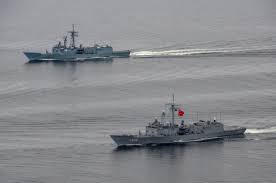Turkey’s attempts to defend the country’s maritime rights in East Med, the 4-decade old conflict on the divided island Cyprus and the Libyan civil war are causing trouble for the world’s premier military organization, NATO, several reports highlight. A NATO probe is underway to investigate whether Turkish military vessels radar-target a French one, as Turkey and EU also disagree on how to divide up the East Mediterranean and on resolving the Cyprus conflict. While there is much to criticize in Turkey’s military behavior, it must be said that the international community pays no attention to the country’s national interests and it traditional alliances in reaching decisions on these issues. It can’t necessarily be concluded that Turkey is the aggressor, and other actors hapless victims.
Turkey is hindering European Union attempts to secure NATO’s help with a maritime arms embargo on conflict-torn Libya, according to diplomats and officials in Brussels.
The EU’s naval operation — dubbed Irini, the Greek word for “peace” — was launched around April 1 as is based in the Mediterranean. The European Council said it has as “its core task the implementation of the U.N. arms embargo through the use of aerial, satellite and maritime assets.”
But Turkey, a NATO member whose efforts to join the EU have stalled, suspects that Irini focuses too much on the internationally recognized Libyan administration in Tripoli and not enough on rival forces under the command of Khalifa Hifter, who launched an offensive in April 2019 to capture the capital.
Libya has been in turmoil since 2011, when a NATO-backed uprising toppled leader Moammar Gadhafi, who was later killed. The country has since been split between rival administrations in the east and the west, each backed by armed groups and different foreign governments.
Hifter is supported by France, Russia, Jordan, the United Arab Emirates and other key Arab countries. The government in Tripoli, led by Fayez Sarraj, is backed by Italy, Qatar and Turkey, which sent troops and mercenaries to protect the capital in January.
On Tuesday, EU foreign policy chief Josep Borrell said that the bloc and NATO “are discussing how to establish a new arrangement of cooperation — not participation — cooperation between Operation Irini and NATO, once again in our shared interest.”
“I hope that this cooperation agreement can be set up on the next days,” said Borrell, who is set to take part in a video conference with NATO defense ministers Thursday.
But two NATO diplomats, speaking on condition of anonymity, raised doubts about whether Turkey would let such an arrangement happen. Because the 30-nation military alliance operates on the basis of unanimity, NATO’s support cannot be guaranteed.
So far, Turkey does not seem to be entirely onboard with the EU operation, and a recent incident highlights the limitations of Irini, which only has two ships and three planes, and needs more.
Borrell said that Irini personnel tried to make contact last week with a “suspicious” Tanzanian-flagged cargo ship that was being escorted by two Turkish warships. He said the ship refused to respond, but its Turkish escorts said the cargo was medical equipment bound for Libya.
NATO said Thursday it has launched an official investigation into a naval incident in the Mediterranean between alliance members France and Turkey that has infuriated Paris.
France has complained vehemently about the incident in which it says one of its ships was subjected to radar targeting by Turkish frigates as it sought to inspect a cargo vessel suspected of carrying arms to Libya.
The incident is the latest flare-up in tensions between France and Turkey, which have clashed over Ankara’s military operation in Syria and more recently over their roles in Libya’s civil war.
The French ship Courbet, on duty as part of a NATO operation, tried to check the Tanzanian-flagged freighter suspected of breaching the UN arms embargo on Libya.
According to French officials, Turkish frigates accompanying the freighter carried out radar targeting on the Courbet three times, suggesting a missile strike was imminent.
Fellow NATO member Turkey has dismissed the allegations as “groundless”, insisting its vessels only observed the Courbet and accusing the French ship in turn of a “”high-speed and dangerous manoeuvre”.
COMMENTARY: The problem is dsimissing the Turkish viewpoint
The Western press always put a pro-Greek and pro-EU spin on developments involving the Cyprus conflict, Libyan civil war and in general Turkey’s naval posture.
Turkey has always claimed that the internationally-recognized sovereign of Cyprus, the Greek Cypriot Administration does not represent the Turkish minority, which had declared its own break-away republic, the Northern Cyprus Turkish Republic. In terms of Eastern Mediterranean, the water-grab by a consortium consisting of Greece, Greek Cypriot Administration, Egypt and Israel are trying to usurp the entire portion of the sea for potential hydrocarbon reserves, essentially locking Turkey up to its own coastal waters. In Libya, it is difficult to find out who is right or wrong, but it is well known that France, UAE, Russia and Egypt are backing and supplying General Hafter with advanced weaponry and mercenaries. It is ironic that UN recognizes Turkey-backed Government of National Accord, which had been left defenseless through an embargo on weapons trade, which doesn’t seem to apply to General Haftar’s forces.
While there is much to criticize in Turkey’s expanding military posture in the Mediterranean, unless a fair and enforceable peace is imposed in Cyprus and Libya, Turkey is left without choices to legitimately defend its national interest.
Yahoo News, AFP, commentary by PA Turkey staff
You can follow our English language YouTube videos @ REAL TURKEY: https://www.youtube.com/channel/UCKpFJB4GFiNkhmpVZQ_d9Rg
And content at Twitter: @AtillaEng
Facebook: Real Turkey Channel: https://www.facebook.com/realturkeychannel/
